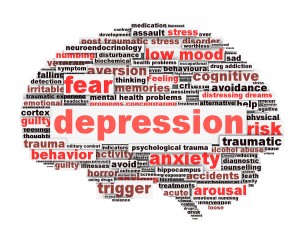Depression isn’t a subject many of us probably think about regularly, and it certainly isn’t a widely discussed topic in the workplace. So I was kind of surprised when a friend brought up his wife’s recent bout with depression during a casual coffee chat the other day. But she’s hardly alone. Around 1 in 6 Americans say they’ve been diagnosed with depression at some point in their lives, and those workers miss an estimated 68 million additional days of work each year, resulting in an estimated cost of more than $23 billion in lost productivity annually to U.S. employers. And now a new Gallup poll identifies another possible risk factor: working part-time. Twenty-seven million people in this country are classified as “part-time workers,” and they are being treated for depression at rates roughly 50% higher than full-time workers. Gallup says at least part of the reason for the higher depression rates is that many of those part-time workers obviously wish they were working more, and are just barely getting by with the earnings they do generate. In fact, more than 14% of part-time workers are under the official poverty line, and poverty is widely considered to be the number one greatest predictor for depression.
And now a new Gallup poll identifies another possible risk factor: working part-time. Twenty-seven million people in this country are classified as “part-time workers,” and they are being treated for depression at rates roughly 50% higher than full-time workers. Gallup says at least part of the reason for the higher depression rates is that many of those part-time workers obviously wish they were working more, and are just barely getting by with the earnings they do generate. In fact, more than 14% of part-time workers are under the official poverty line, and poverty is widely considered to be the number one greatest predictor for depression.
“14% of part-time workers are under the official poverty line, and poverty is widely considered to be the number one greatest predictor for depression.”
During the recession and the so-called official recovery, far more Americans have fallen into poverty, after being laid off or shifting to part-time work. With rising health care costs continuing to eat up more and more public and private top line dollars, employers are obviously taking steps to try and positively affect the physical well-being of their employees. And more attention is being paid seemingly to improving the mental health of employees as well. Currently, some 85 percent of H.R. professionals say their employers offer mental health benefits, a number which may go even higher with the implementation of the Affordable Care Act expansions for mental health coverage. More employers could also offer access to employee assistance programs (78% of H.R. professionals say they do).
“I think we’ve come a long way in terms of identifying that depression is an important issue in the workplace.“
“I think we’ve come a long way in terms of identifying that depression is an important issue in the workplace,” says Dr. Michelle Riba, M.D., a clinical professor in the Department of Psychiatry at the University of Michigan. The Americans with Disabilities Act prevents employers with 15 or more employees from discriminating against people with serious health problems (including depression), and it requires them to accommodate disabled employees. In order to be protected by the law, however, employees must disclose the nature of their disability to their employers. Clare Miller, the director of the American Psychiatric Foundation’s Partnership for Workplace Mental Health since 2003, says disclosure is probably a good idea if depression is causing an employee’s job performance to suffer. “But try to do it early in the game as opposed to waiting until you get a bad performance review,” she adds. She also says workers should be prepared to provide documentation from their doctors. How much does your company or organization think about mental health? Do you consider it an integral and active part of wellness? Have you taken steps to educate managers about how to deal with depression in the workplace? Do you think your employees are comfortable asking for time off – and help?
Read more at Staffing Talk.
